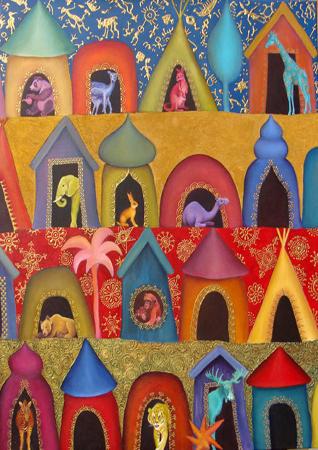Columnists
Sikhi in The Global Village
by MICHELE GIBSON
Our perspective of the world as a global community is a recent one.
Some ideas and needs transcend local interpretation or action, concerns over the rights and freedoms of individuals and the protection of the environment. We recognise that these are things we need and wish to address, or have others examine and address on our behalf.
We have all moved a great deal since the original land mass Pangea, began to shift and differentiate. We were, naturally, intuitively inspired to seek greater truths and faiths emerged and provided substance for the inhabitants of the planet.
However, we have continued to be mobile - for conquest, to escape persecution, or for economic or personal reasons. As a result, we incur tension in the transitions with other cultures, including adjustments in language, dress and activities.
And religion is not exempt from these pressures. Even without movement, religion is stressed by the passing of time, societies evolve and adapt to new knowledge, new economics, new fashions and trends, and these changes creep into the culture of worship.
Words are a great example of this.
A 'personal floatation device' would be regarded as gobble-de-gook at some point in the past. Not so long ago, a ‘desk top' was just the top of your desk. Thus, new terms creep into common usage and are bound in culture; they become current, trendy and even entrenched - but they always change, they are always evolving.
How then does religion adapt? How does the seemingly supra-cultural dovetail with the cultural? How does a distinct spiritual belief manage with the passage of time or the movement of populations?
In addition, a religion such as Sikhi demands a personal commitment to seeking the truth as a key component of faith. It expects that there will be devotion and service but also intellectual examination of the scriptures - by each member on his/her own.
Thus, Sikhi, which is one of the most - arguably the most - egalitarian bodies of faith in the world, does not leave the interpretation of the scripture to a handful of specialists but demands constant individual study.
So the question becomes - how does one adapt to the vagaries of time, the tension between societies and cultures and individualized interpretation without creating a million different versions of Sikhi?
How can a follower determine what the imbedded cultural and historical influences are that can be discarded and modified to reduce the tension for the times or the setting?
Few scriptures predicted this problem and built in safeguards for this. Few envisioned that their work and devotion would travel so far and interact with so many.
The language difficulties alone are almost insurmountable. A comma could mean the difference between a directive and an aside. Who should be responsible for deciding this?
In some religions with a more hierarchical structure, specific groups are given this job. They are viewed as specialists and are often academics and scholars. But they are far from the point of everyday practice and are not often able to trickle down directives that keep pace with the tempo of change at the ground. Sometimes their interpretations have been rejected for these very reasons - they either move too quickly ahead of fundamental views or not fast enough for the perceptive practitioner.
The cost of this is splintering.
The Christian faith has been subject to this. Henry VIII rejects tradition and the Holy Roman Empire to suit his personal needs, but long before him, others were already questioning the articles of faith and their adherence to the written word.
Was culture and ritual creeping in where it should not be or were they rejecting articles of practice because they were thousands of miles now from where these had been set into practice? The result is a frightening array of denominations and variations of faith and practice.
What is the cost? I will tell you!
I have read with every major Christian denomination and have yet to find one that I can call home. I miss being able to call one my home. I miss the sense of community, I miss the shared vision, I miss feeling confident that I know what to do and what to think. A million commas stand between me and my sure grasp of the scripture; three languages, multiple translations - dotted with political intrique and cultural conflict, and a thousand years of ‘English'.
I have faith but it was not easy to hold on to and was in crisis on more than one occasion. Sure there are fundamentals, but even those are disputed in Christianity.
Sikhi is a remarkable faith, and one that also provides me with a home and a great deal of comfort.
I urge the community to find a method to address these global issues for the sake of the preservation of the integrity of one of the most advanced forms of thought and faith to ever come out of the essence of mankind.
February 15, 2010
Conversation about this article
1: Gurjender Singh (Maryland, U.S.A.), February 15, 2010, 11:18 AM.
This is a very interesting article. You are so correct that we need to look at Sikhi in the context of the global village. It is not a Punjabi or subcontinental religion any more. Every day, more and more changes are being faced by Sikhs in the world, which they have not faced back 'home' (where Sikhs are not even recognized by the Indian constitution). I think that now the jathedars of the Takhts and the S.G.P.C. should involve Sikh leadership from around the world, to discuss the issues and implement the solution ... without, of course, sacrificing any of the Sikh values. There are so many issues around us. Some that I see as important are: 1) The turban; 2) The kirpan; 3)Chairs for senior citizens who cannot sit on the floor in gurdwaras due to age or medical reasons; 4) How to teach Sikhism to the world; 5) Use of other languages beside Punjabi for the Guru Granth; 6) How to train parcharaks in real Sikhi, not just to do paatth or kirtan without knowing the meaning of it; 7) Sikh literature; and 8) Parcharaks trained in others languages.
2: Gurdip Singh Chana (London, England), February 15, 2010, 3:50 PM.
"So the question becomes - how does one adapt to the vagaries of time, the tension between societies and cultures and individualized interpretation without creating a million different versions of Sikhi?" Michele, I believe you need to escape the boundaries of organized religion and truly vision for yourself what Guru Nanak intended. Sikhi is a global faith; it can apply to a person of any culture, religion, age, gender, skin colour, etc - Why? Because it is about the MIND only. I would like to point out that cultural matters are only skin deep - our different versions of Sikhi are created because a certain school of thought enriches each individual's mind. If ultimately one becomes attached to the Guru without having conflicting beliefs, then this is the way forward. Therefore, I believe as long as we continue to educate the world about Sikhi, people will become members of the Sikh fold - each individual is encouraged to interpret their own means; however with any intellectual philosophy, you will have schools of thought. These "schools of thought" will inevitably have differing practices; however, as long as we stress from the beginning that Sikhi is about improvement of the Mind (the source of all problems)! All traditions, cultural names, languages, mean nothing - only the Word and God. You have written an absolutely wonderful piece of work here - I share your vision of the universality of Sikhi - only let's not get bogged down with too much thought on organizing the masses; let God take care of that. The important thing is the Guru's Word is grasped. This is how cultural problems, historical issues, any possibility of creating a million different versions of Sikhi are simply dissipated! Because as ordinary humans, we shall live each day in happiness, learning each day about God from the Guru and living by His Will.
3: Irvinder Singh Babra (Brampton, Ontario, Canada), February 16, 2010, 4:37 PM.
Many Sikhs today have discarded and disowned the articles of faith. But Sikhi is still on the go with a new, greater gusto. The Guru's Sikhs continue to make an emphatic entry and exit wherever they go. They care, they do well in public life, they are some of the kindest, generous people; they are Santa Clauses all round the year, they rise and shine, and remain a significant part in the comity of world's religions.






